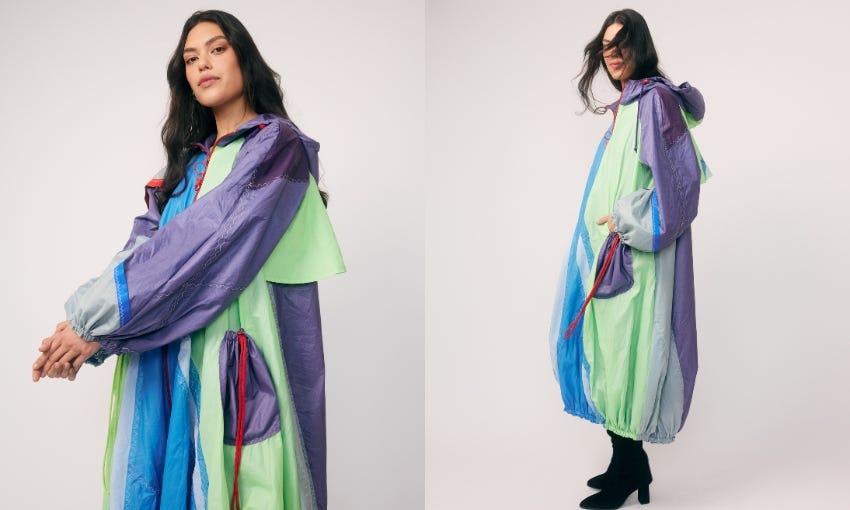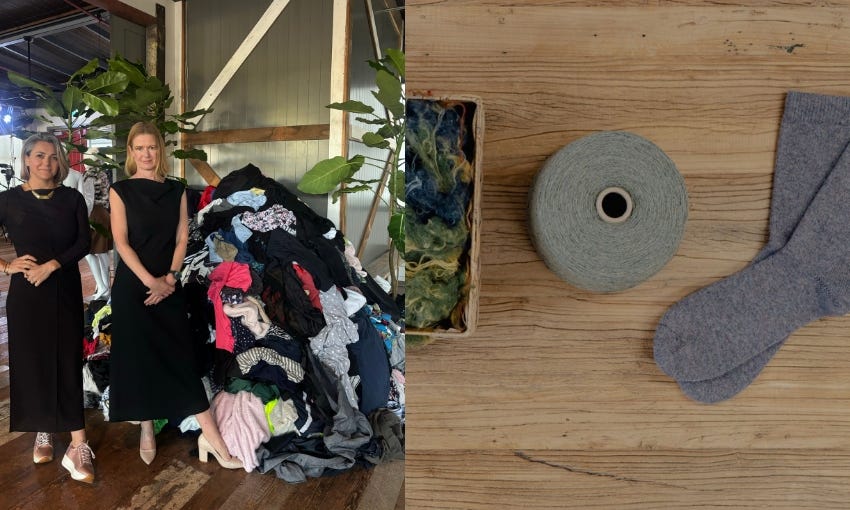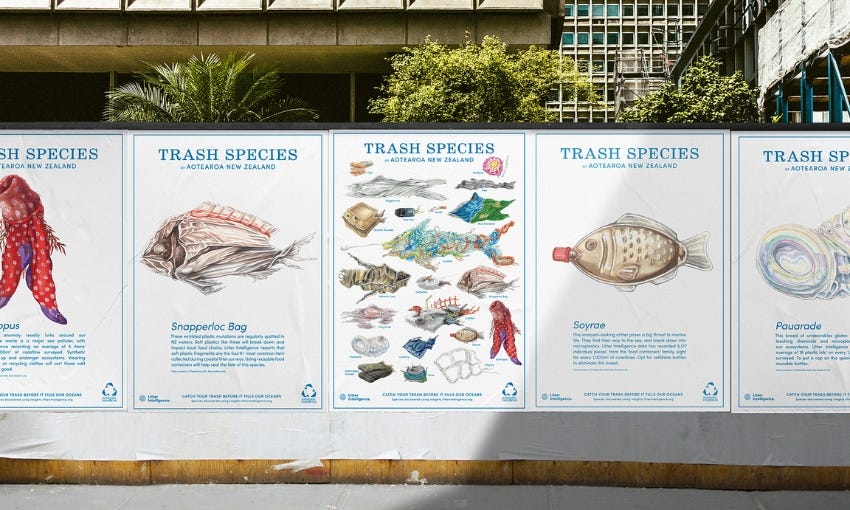Kia ora, welcome to Future Proof. Thanks for joining me. This week: the trash species of Aotearoa, and the most impressive select committee submission ever. But first: this beautiful raincoat had a former life at sea.
Image credit: Mindful Fashion.
This raincoat’s fabric once billowed in salty sea air, catching the breeze to propel sailboats across the water.
“It's had this life on the ocean. It's been surrounded by wind. Wind is its friend, and I wanted it to have a kind of a life that was a gentler version of that on land,” says designer Sue Prescott.
The joyful jacket won the Award for Material Innovation at the 2024 Mindful Fashion Circular Design Awards last month. Prescott was inspired to craft the piece from old nylon spinnaker sails – otherwise destined for landfill – with their “fantastic colours” and “incredible zigzag stitching the sailmakers use”. On the jacket’s inner lining, a ship’s number extends down the centre-back, a nod to its former seafaring life.
Prescott has already received requests to borrow the sailboat raincoat, dubbed Southerly Change, which she sees as emblematic of the type of relationship we should be developing with our wardrobe. “It’s about creating emotional connection with your clothing. Because if you've got a piece of clothing and it's got a hole in it, or a seam rip or something, you can repair it. But people have forgotten we can do these things.”
Jacinta FitzGerald, chief executive of industry sustainability organisation Mindful Fashion, says the piece is a “showstopper” while still being functional. The awards, now in their second year, challenge entrants to “reimagine fashion as circular and design out waste”, breathing new life into overlooked waste materials. “We know that 80% of a garment’s impact is determined at the design stage. So those decisions are really important,” FitzGerald says.
This year, the awards featured a new Circular Business Innovation Award, recognising efforts to put circularity into business practice. Untouched World, a brand renowned for their sustainable pieces worn by US presidents, won the award with their Rubbish Socks initiative. The product makes use of the very last bits of textile waste – shredding it, spinning it, and blending it with merino to make warm, woolly socks.
“It's a delightful reuse, without downgrading, for a product that has typically gone to waste,” says Untouched World founder and chief executive Peri Drysdale. The textile waste is broadly grouped based on three colours, and the socks end up with “beautiful fibres of different colours” flecked through the wool.
The socks have proved popular. “The name is quite catchy, and I think people like the idea of giving their friends some rubbish,” says Drysdale.
Left: the pile of clothes representing the half-tonne of clothing that goes to landfill in New Zealand every five minutes. Right: Untouched World’s rubbish socks. Image credit: Mindful Fashion.
While the winning pieces wowed with their functional beauty and innovation, a haphazard heap of clothes on the floor at the awards ceremony proved equally attention grabbing. Weighing half a tonne, the pile represents the amount of clothing that New Zealand sends to landfill every five minutes.
“It’s confronting,” says FitzGerald. “We’ve got a lot of really cheap synthetic clothing coming into New Zealand that goes to landfill very quickly. Our op shops are inundated. They can't sell 80-odd percent of what gets donated to them – the charity shops have to spend thousands of dollars sending these garments to landfill.”
Each week, 70 truckloads of clothing get dumped at Redvale landfill in Auckland. Kiwis are buying three times more clothing than we did 20 years ago, and keeping it for half as long, consuming 14.3kg of clothing per person every year. This rampant consumption puts pressure on the Earth’s finite resources – globally, clothing and textiles contribute 8% of greenhouse gas emissions. Adopting a circular design approach that considers the whole lifecycle of a garment could cut emissions by one-third here in Aotearoa.
Overseas, France is progressing legislation to crack down on ultra-fast fashion, and California is proposing a bill that would require clothing manufacturers to implement and fund recycling schemes for the products they make.
“We need something similar in New Zealand, because we are simply getting inundated with clothing that is polluting our beautiful natural environment,” says FitzGerald.
In the meantime, she encourages consumers to slow down, think about cost-per-wear, buy the best quality you can afford, and keep a garment in use for as long as you can.
See all the winners of the Mindful Fashion Circular Design Awards here
Watch: Home Education, episode one
Home Education begins on a pick-your-own dahlia farm. Three years ago, Jen gave her children $100 to start a business as a learning project. Having fallen in love with dahlias, Gracie spent her money on some dahlia plants. Today, they have a thriving dahlia farm with almost 4,000 plants. “It’s a beautiful way to live,” says Jen. Now, the farm is a classroom. Gracie, Milly and Lexie learn maths at the till counting out change for customers, science while testing different options for flower food and art as they market their flowers. Made with the support of NZ On Air.
Fast-track project list raises zombies from the dead
The government released the list of 149 projects to be included in the controversial Fast-Track Approvals Bill on Sunday. Shanti Mathias breaks down the numbers: from 55,000 houses, to 365,000 tonnes of waste, to 40 years of an open-pit gold mine. The list of projects is “not all bad news,” Gary Taylor of the Environmental Defence Society told Newsroom, although many were “questionable”. Forest & Bird noted to RNZ that the list included several “zombie” projects that had been rejected previously.
A meat lover’s guide to eating for the climate
One of the most impactful changes you can make to reduce your personal carbon emissions is to switch to a plant-based diet. But what if you love cheese and a burger? Madeleine Holden has some practical tips for climate-friendly eating if you can’t quite give up meat and dairy completely. Lucinda Bennett of
has some further tips for preparing “unpopular” but more environmentally friendly kaimoana.Is this the most impressive select committee submission ever?
To a pumping soundtrack of Kora’s ‘Politician’, Ben Nevell frolics in the floodwaters of South Dunedin. It’s a stunning finale to an impassioned submission against the Crown Minerals Amendment Bill, which reverses the ban on offshore oil and gas exploration. It’s a legislative move that government officials warned will harm New Zealand’s international reputation and relationships, as well as continuing to lock in planet-heating carbon emissions from fossil fuels. Gabi Lardies explains some of the controversy around the bill and its particularly short consultation window – public submissions were open for just five days.
Join us for a one-night only live event
We’re huge fans of local television here at The Spinoff, and for one night only we want to celebrate some of our all-time faves. Join Alex Casey, Kura Forrester, Rhiannon McCall, Stewart Sowman-Lund and Lyric Waiwiri-Smith at Q Theatre on October 31 as we unearth some beloved TV gems and argue for their place in our history.
More stories
Shanti Mathias was in South Dunedin last week when floods hit. She reports on how the community fared, and what happens next for the low-lying area. (The Spinoff)
While Moo Deng the pygmy hippo captures hearts around the globe, her species is struggling in its West African homeland. (BBC)
The UK’s last coal-fired power plant has officially closed. (Carbon Brief)
Mike Casey of Rewiring Aotearoa wants everyone to have an “emissions epiphany” and swap fossil fuel machines for electric ones. (The Spinoff)
Australia will protect 52% of its ocean territory by expanding a subantarctic marine park – but some crucial wildlife habitats miss out. (The Guardian)
Will New Zealand back out of the Paris climate agreement? George Driver considers our targets. (The Spinoff)
Colombia has announced a $40-billion plan to transition away from fossil fuels. (Climate Home News)
Sir Peter Jackson and Fran Walsh have invested $10 million in a de-extinction startup, aiming to revive extinct species like the dodo. (NZ Herald)
Norway becomes the first country in the world to have more EVs than petrol-powered cars – thanks in part to government incentives funded by oil and gas sales. (Washington Post)
Meet Scout, a clever dog sniffing out possum poo on Otago Peninsula. (Predator Free New Zealand Trust)
Join our community of supporters
"I like that it feels like chipping in for a good cause, rather than paying for a subscription." - Kimberley, Spinoff member.
Whether you read, listen to or watch our mahi, you can support us to do more by donating today or signing up to become a member. Already a member? Ka nui te mihi, your support means the world to us.
Image credit: Sustainable Coastlines.
To finish this issue, meet the trash species of Aotearoa. The iconic fish species poster that adorns fish’n’chip shops across the country has been reimagined by artist Erin Forsyth, Sustainable Coastlines and creative agency Augusto. The new poster features litter critters like the quarter flounder, pauarade, and snapperloc bag – inspired by the real rubbish that clogs our coastlines. “The message is simple: catch your trash before it fills our oceans, whether that’s changing your buying habits or making sure something is disposed of properly,” says Helen Adams-Blackburn from Sustainable Coastlines. The Trash Species artwork is on display now in Wynyard Quarter in Auckland.
Make a splash, not trash,
Ellen
Future Proof is looking for a sponsor!
Connect your brand with an insightful exploration of environmental news, reaching influential readers committed to sustainability and staying informed about the state of our natural world. Contact commercial@thespinoff.co.nz to learn more.
Got some feedback about Future Proof or topics you’d like covered? Get in touch with me at futureproof@thespinoff.co.nz













